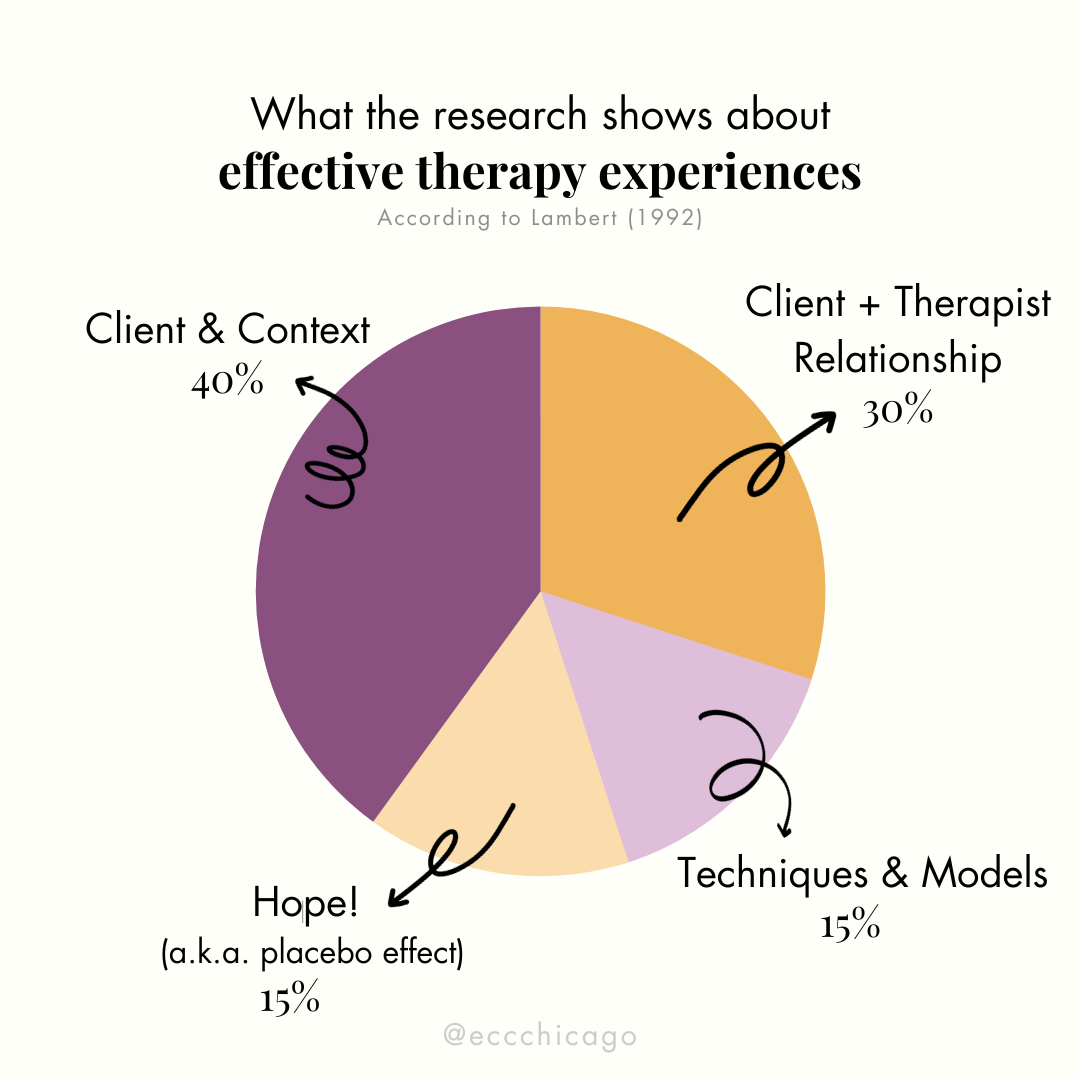What Matters More: The Therapy Method, or the Therapist?
If you’re new to therapy, you may find yourself wondering which type of therapy is right for you, and beyond that, what is more important: the therapist, or therapy method? Perhaps you’ve met with a therapist before and it didn’t go well, but you’re not ready to give up on therapy yet. The good news is that research has given us some good indicators on how to set ourselves up for success in a therapy relationship—for both therapist and client.
What the Research Shows About Effective Therapy Experiences
According to foundational studies in psychotherapy, such as Lambert 1992, there are a few important components that contribute to therapy’s overall effectiveness for a client.
30% : Client-Therapist Relationship – Does the client feel safe, heard, and cared for in their therapeutic relationship? This is the biggest factor in the therapist’s control toward creating a helpful outcome from your therapy experience.
15%: Technique & Models – These are the therapist’s tools and techniques for approaching a client’s needs. There are many different modalities in therapy, a few you may have heard of: Emotionally Focused Therapy (EFT), Dialectical Behavior Therapy (DBT), Attachment-based Therapy, Cognitive Behavioral Therapy (CBT), and Eye Movement Desensitisation Reprocessing (EMDR).
15%: Hope (a.k.a., the Placebo Effect) – This is the client’s attitude towards therapy and their hope in the process itself, but the therapist plays a role here in instilling hope for the client’s ability to grow and change.
40%: Client and Contextual Factors – This is the client’s willingness and readiness for change, but it also includes outside forces that may impact a client’s well-being, stressors, access to basic needs and medical care, as well as other factors including job changes, parenthood, etc.
With all of this in mind, the most important elements in choosing a therapist are the quality and connection in the therapeutic relationship. Change can occur across modalities—but if you like the approach and don’t feel completely safe or understood with the therapist, you’re less likely to experience positive change. Ideally, you should feel empowered to have a quality therapeutic relationship alongside a model and technique that is effective for your needs.
Tips for Finding the Right Therapist and Method
Online searches may pull up hundreds of different options as you search for a therapist near you, and that can be very overwhelming, especially if you’re already experiencing stress in your life. If you’re stuck on how to find the right fit, here are a few tips for starting your search:
Think about your goals for therapy. What parts of your life, or what ways that you cope, do you hope to improve? Knowing your goals can help you pick the modality that’s the right fit for you, and build a relationship with your therapist as you work towards a shared goal.
Explore types of therapy that may help you. You can start by asking a friend who has been to therapy, or by researching online. If you’re not sure what to search, you can start with any of the modalities mentioned above.
Search for resources near you. Searching by specialty and location, e.g., “EFT therapists near me” or “EFT therapists in [your city]” can help narrow down your search.
Finding the Right Therapist and Method: ECC’s Approach
At ECC, we know how overwhelming it can be to find the right therapy fit to effectively address your unique needs. We’re committed to helping every client find the right therapist and the right modality, and we’ve designed our intake system to reflect that.
When you reach out to ECC for care, we:
Provide a full list of therapists that have immediate availability, along with their bios and openings. This allows you to choose the therapist that resonates with you, as opposed to a random assignment to an open therapist.
We allow you to set up consultations with clinicians so that you can get firsthand experience to decide if the relationship and methodology are the right fit.
Offer flexible payment options. We can work with your insurance provider, or provide sliding scale or self-pay options if you don’t have insurance coverage.
Our multidisciplinary staff can help you achieve your goals when you’re ready to seek care. Not sure if you’re ready to start therapy? We think the fact that you’re here reading this blog is a good sign. 😉 When you’re ready to get started, fill out our intake form here.
About ECC
Empowered Connections Counseling is a practice of licensed therapists providing quality, multidisciplinary counseling for adults, children & teens, relationships, and families in Chicago and across Illinois. Whether by in-person session or via telehealth, we can work with you to find the therapist and treatment methods that best suit your needs. Connect meaningfully with your life by booking an appointment today.

